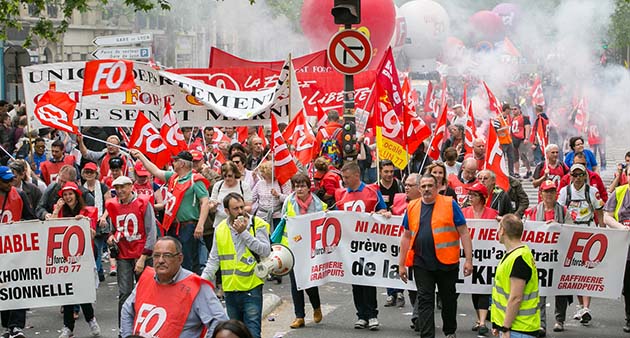A wave of strikes and protests to defend workers’ rights is causing a crisis for France’s Labour-type government. President Francois Hollande’s proposed Work Law increases working hours and gives bosses more power to sack workers.
Oil refinery workers have walked out against the law. Only violent police attacks on roadblocks outside fuel depots have partially defused a severe petrol shortage.
The government is depleting its strategic reserves in an attempt to weaken the strike. But the majority of oil refineries remain on strike.
Bosses at the oil import terminal in Le Havre tried to release supplies for airports on the orders of prime minister Manuel Valls. So workers walked out there too.
CGT union rep Fabian Bourdoulous said, “Since they opened the valves, we pulled all our members out on strike. They’re not exactly going to restart the economy with what’s left in those tanks.”
Nuclear workers at the Nogent-sur-Seine are also hitting bosses hard. The plant functioned at less than half capacity, with production down by over 1000 megawatts.
CGT rep Olivier Michard said, “We didn’t quite know what mood the police would be in, so we came in early to set up our barricades in peace.”
The escalation of strikes against the proposed Work Law has demonstrated vividly how workers keep society running—and how they can shut it down.
The eighth day of nationwide mobilisation against the laws was held at the end of May. Only one newspaper was in shops, the left wing l’Humanite. Print workers refused to print any of the others after they refused to publish an article by CGT union leader Philippe Martinez.
The “Nuit Debout” movement of city square assemblies—meaning “up all night”—was also triggered by the revolt against the work laws. Its activists have joined workers’ actions. Some hospital workers have also joined “Hospital on our feet” assemblies, launched out of the Nuit Debout movement, including one third of the workers at Le Havre hospital.
Attrition
The government and police are waging a war of attrition on the sectors leading the strikes.
But hundreds of thousands of people are marching—and more sectors are joining the fray.
Bus workers in Paris are set to begin an indefinite strike, while dockers plan to walk out for a day.
A three-day aviation strike is also set to begin. Rail workers have begun an indefinite strike and say they are prepared to disrupt the Euro 2016 football tournament. Nearly half of train services have been cancelled.
The Work Law is set to be debated in France’s senate, where the right-wing opposition has a majority.
Between horrifying police repression and concessions to split off some groups of workers, the government is gambling that the movement will run out of steam.
Union leaders’ aim of “bringing them back to the negotiating table” makes this a real possibility.
The CGT union leaders cannot be trusted to call the general strike that would defeat the Work Law and open up a new potential for resistance to austerity.
But activists are going all out to build more strikes for the movement’s first national demonstration on Tuesday 14 June when the Senate debate begins.
Work Law would eliminate crucial rights
The French government’s proposed Work Law blows a hole in workers’ hard-won rights. It’s a bosses’ charter for cheaper layoffs, longer hours and lower wages.
Firms could lay off workers they no longer see as profitable. All firms will be able to start restructuring programmes currently restricted to those firms in financial crisis.
The law’s central measure is Article 2. It allows workplace agreements to undercut national or sector-wide agreements.
This effectively ends national bargaining and allows a race to the bottom.
Bosses long to roll back French workers’ rights. The European Union’s leadership recently issued recommendations encouraging the French government in its attack.
The government has demobilised some sectors of resistance by offering concessions.
This has also given others more incentive to fight, and pushed the powerful bosses’ union and hypocritical right-wing opposition to come out against the law.
Between this and a backbench rebellion, the government lost parliamentary support for its reform. It has used a part of the French constitution which allows it to suspend parliamentary debate.
But this further inflamed anger and gave the movement new life. It raises the possibility of a vote of no confidence toppling the government.
By Dave Sewell
Socialist Worker UK






